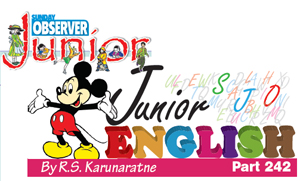This is a guide to help learners to communicate easily in both speech and writing through a better understanding of the English language.
Much / very
As a general rule ‘much’ is used with participles and ‘very’ with adjectives. ‘Much’ is also used with comparative adjectives.
James is much older than his wife.
Your room is much bigger than mine.
Local shoes are much comfortable than imported ones.
The principal will buy much needed books for the school library.
I don’t have much time for films.
The fishing industry is very important to Sri Lanka.
Do not use ‘very’ with adjectives that have ‘very’ as part of their meaning:
Roger met with a terrible accident. (terrible = very bad)
Do not use ‘very’ on its own with verbs and prepositional phrases. Instead use ‘very much.’
Nagasundaram was very much in demand as an English lecturer.
‘Very’ is used to emphasise that you are talking exactly about one particular thing or person.
Now you have to start at the very beginning.
Those were his very words.
The very thought of food made her feel ill.
Mucus / mucous
‘Mucus’ means ‘a thick liquid produced in parts of your body such as your nose.’
‘Mucous’ is the adjective.
‘Mucous membrane’ is the thin layer of skin that covers inner parts of the body, such as the inside of the nose.
Must
‘Must’ is a modal verb. The past tense of ‘must’ is ‘had to.’
All airline passengers must wear seat belts.
You must work hard to pass the examination.
Must I pay now?
Accidents must be reported to the nearest police station.
‘Must’ is used in negative sentences to say that something should not happen.
No one must disturb the students sitting the examination.
Do not use ‘must not’ to say that it is not necessary for someone to do something. Use ‘need not.’
You need not answer nuisance calls.
‘Must see’ is used in informal English to say that something like a film is so good that you should see it.
‘If you must know’ is used in spoken English when answering a question that you think someone should not have asked because it is slightly impolite.
“Well, if you must know, I’m 46,” Diana said.
‘A must’ is something you must do or must have.
Warm clothes are a must in Canada.
‘Must’ is used only in the present tense.
Soldiers must obey orders.
Mute ‘e’
The spelling of words or suffixes formed from words ending in mute ‘e’ has always been a source of confusion.
A mute ‘e’ at the end of a word is retained before a suffix beginning with a consonant.
Tame – tamely
Home – homely
Blame – blameworthy
Judge – judgement (also spelt judgment)
Acknowledge – acknowledgement (also spelt acknowledgment)
There are exceptions:
True – truly
Due – duly
A mute ‘e’’ at the end of a word is dropped before a suffix beginning with a vowel.
Love – loving
Prove – proving
White – whitish
There are a number of words in which alternative spellings exist.
Rate – rateable or ratable
Mile – mileage or milage
Naïve
‘Naïve’ is an adjective meaning ‘not having much experience of how complicated life is so that you trust people too much and believe that good things will always happen.’
A naïve young girl has joined our staff.
‘Naïve’ is the accepted Anglicised spelling of the French word ‘naïve.’ The nearest English meaning is ‘ingenuous, unsophisticated or showing natural simplicity.’ It is a useful word because there is no exact equivalent in English.
Napkin / serviette
The napkin is a square piece of cloth or paper used for protecting your clothes and for cleaning your hands and lips during a meal. It also means a sanitary pad.
‘Serviette’ is a term frowned on by many people as a genteel euphemism for ‘napkin’ which has a wider application with some less pleasant associations.
